*This post may contain affiliate links, which means I may receive a commission (at no additional cost to you!) if you make a purchase using any of these links.*
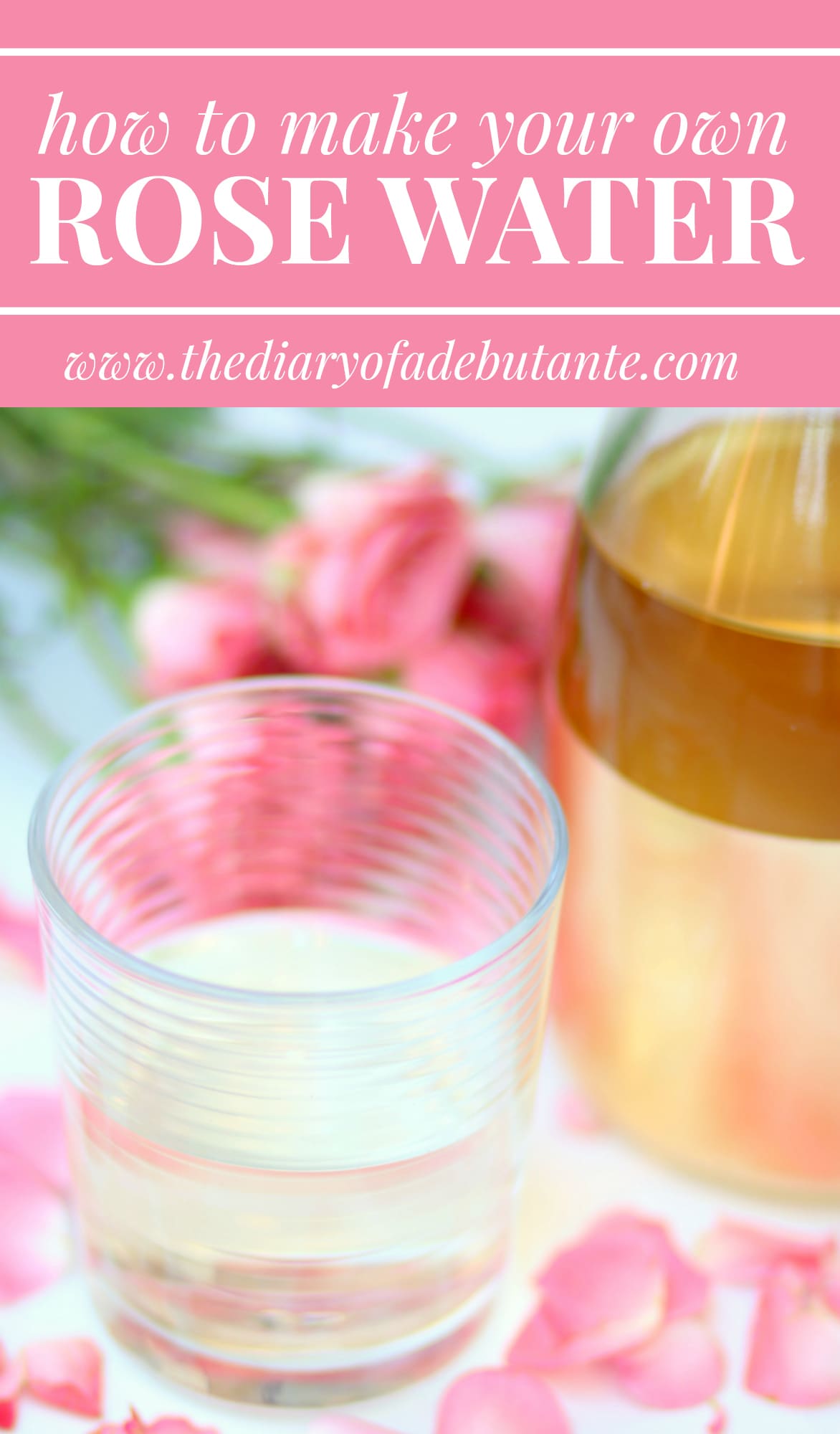
Rose water is one of those ultra-healthy secret beauty potions that most women (myself included) are willing to pay top dollar for. And don’t get me wrong– it’s for good reason, too. Rose water is known for calming rosacea and acne, hydrating and moisturizing skin, balancing the skin’s pH levels– and the list of beauty benefits goes on and on. What most people don’t realize, though, is that rose water is also a great addition to desserts and cocktails. In fact, Kyle and I regularly ate at an amazing Neapolitan pizza restaurant called Meanwhile in Belfast when we lived in Maine, and they made the most delicious rose margaritas using homemade rose water. Naturally, I tried to recreate the recipe when we moved back to Florida, which is how I became an expert at how to make rose water.
In a nutshell, the easiest way to make rose water at home is by infusing pure rose oil into distilled water, adding in a few tablespoons of vodka, and letting it sit for a few minutes. Pure rose essential oil, which is similar but not the same as rose absolute oil or extract, is hard to find in stores, so I decided to try to make rose water at home using fresh petals. Here’s how you do it step-by-step:
How to Make Rose Water at Home
Ingredients
Here’s everything you need to make 2 cups of rose water at home–
- One cup fresh organic rose petals
- 2 cups distilled water
- 2 tsp vodka
You’ll also need a saucepan and fine mesh strainer for this recipe. A funnel will come in handy, too.
Homemade Rose Water Recipe
Step 1
Either cut or purchase a small bouquet of fresh and fragrant roses. Although it’s not absolutely necessary, try to pick an organic, pesticide-free, and edible type of rose, like Rosa Damascena (also known as the Damask rose), Rosa Centifolia (also known as the Provence rose, cabbage rose, or Rose de Mai), or Rosa Gallica (also known as the Gallic rose, French rose, or rose of Provins).
If you’re dead set on picking up a regular bouquet at the grocery store, that’s still fine. Just rinse the flowers extra well and add in a little extra vodka (more on liquor in a minute).
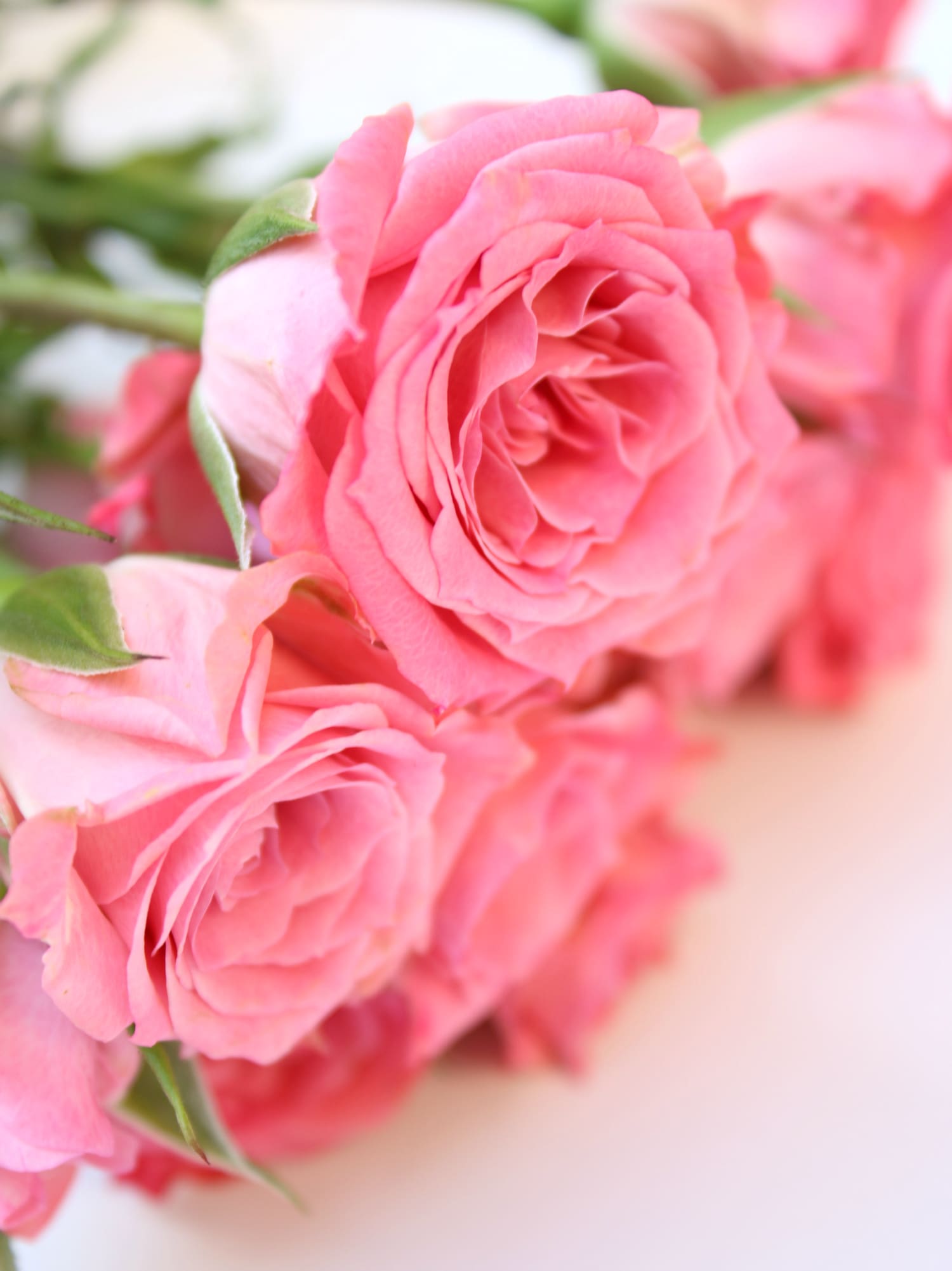
Step 2
This next part may hurt your heart a little bit, but the end result will be worth it, I promise. Pull the fresh petals off 2-3 roses. You’ll need enough to fill one cup, and the number of flowers needed depends on the size of the petals. Also, be sure to use only one type of rose, since each species has its own distinct smell. Mixing the petals of different roses can mess with the overall fragrance of the rose water.
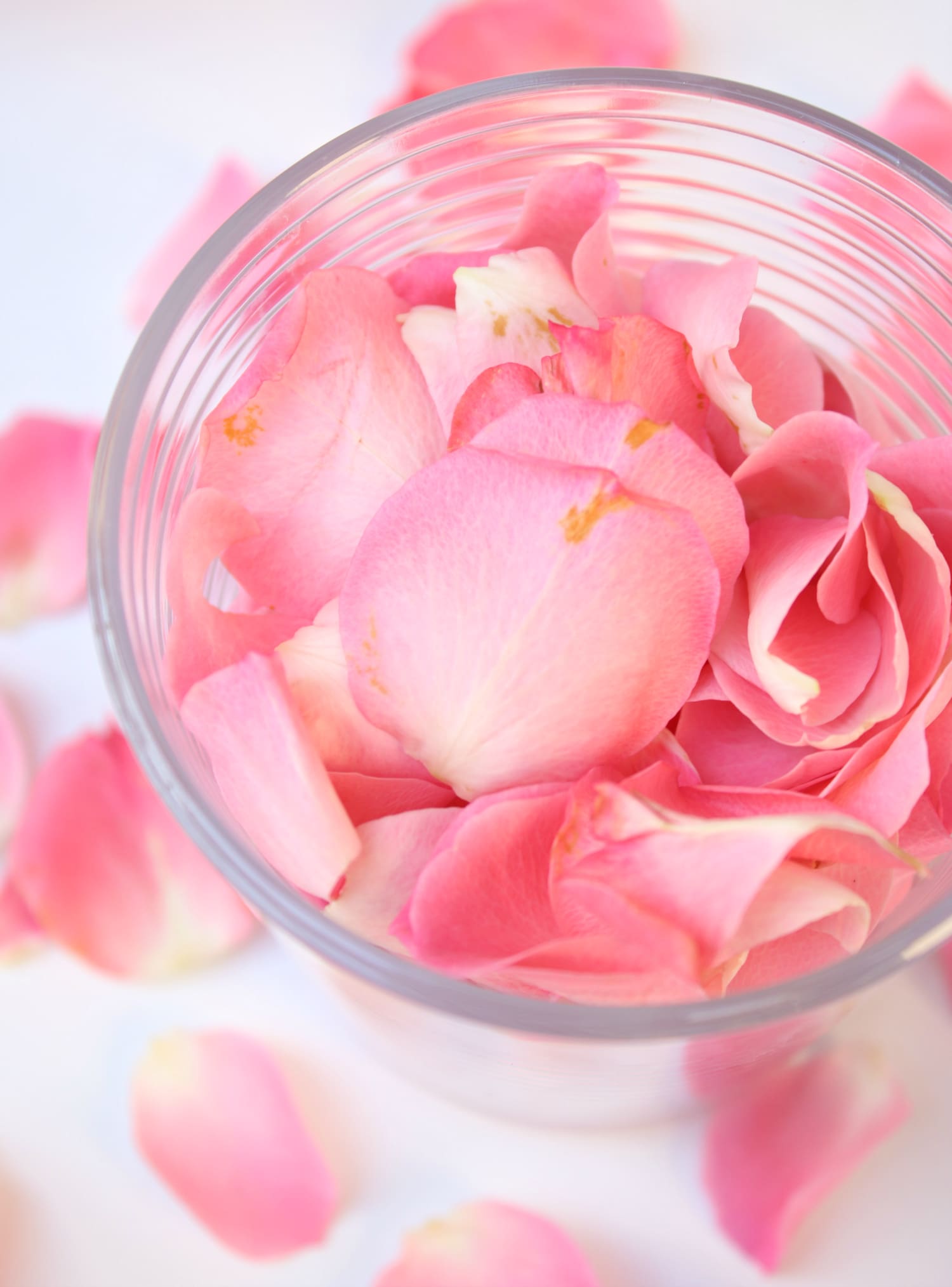
Gently rinse the rose petals with water to remove any dirt before moving on to Step 3.
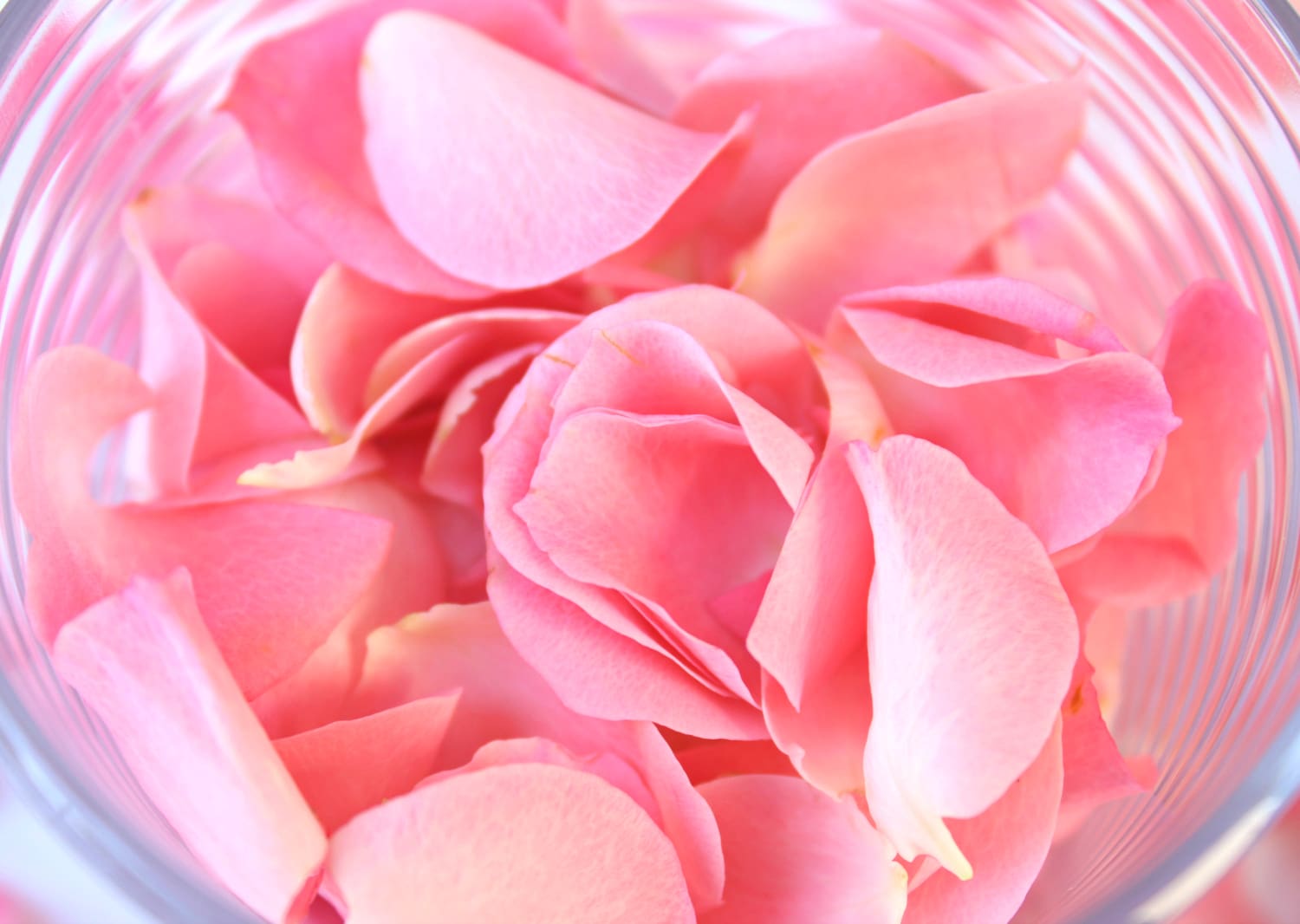
Step 3
Transfer the petals into a sauce pan and pour in approximately two cups of distilled water. Feel free to add more or less, but make sure that the water doesn’t completely drown the petals. Too much water will make your homemade rose water less fragrant (and effective).

Step 4
Add in 2 teaspoons of vodka. I used Deep Eddy because it’s all we had, but more affordable brands like Smirnoff and Svedka work just as well. Vodka helps to preserve the rose water and makes it last longer in the fridge. It has an astringent nature, too, so it also kills bacteria.
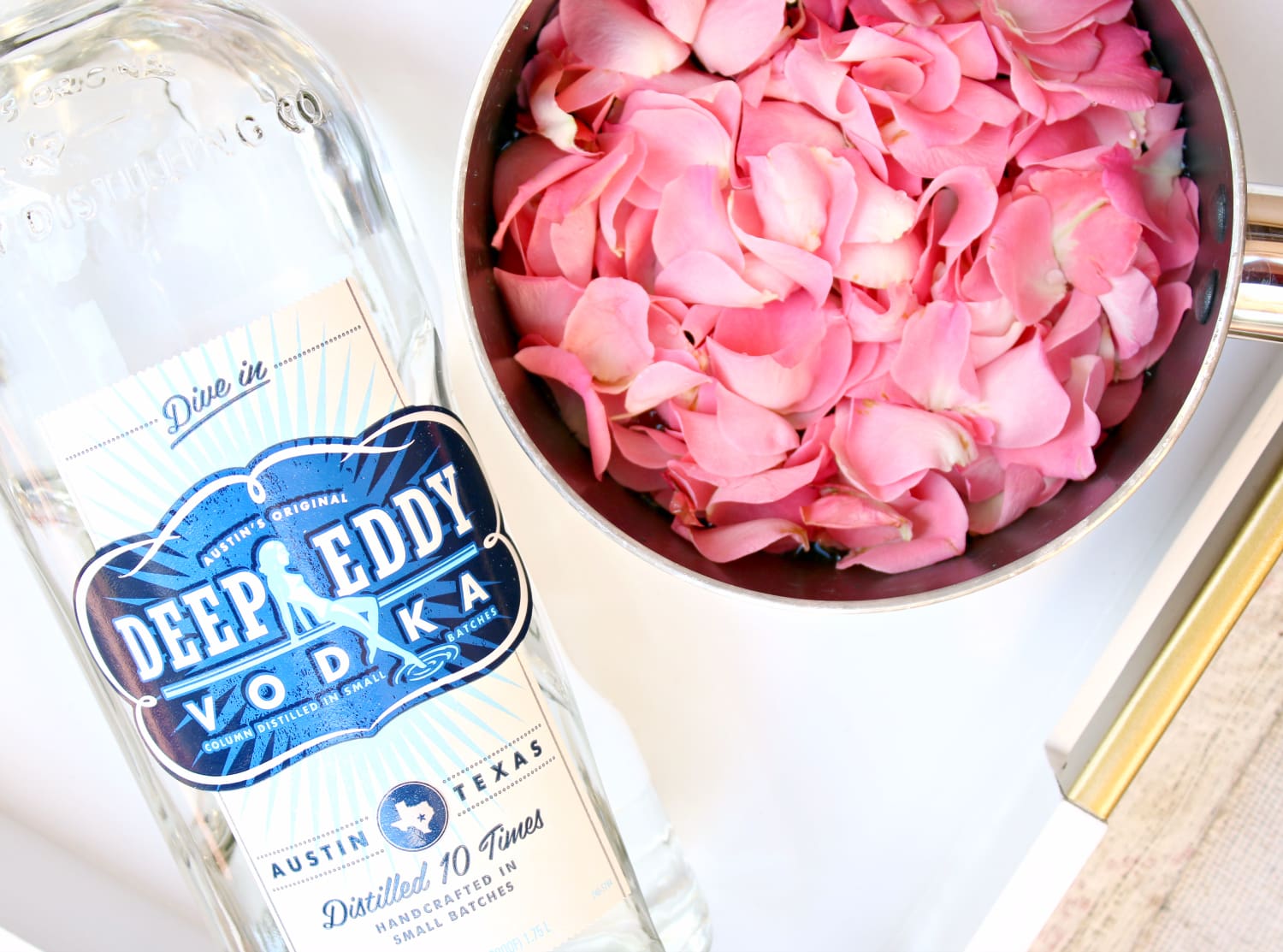
Step 5
Cover the saucepan with a lid and let the rose water cook on very low heat for about 20 minutes. Using too much heat will ruin the color (and potentially other benefits, too) of your rose water, so check intermittently to make sure the water isn’t simmering.
Step 6
After about 20 minutes, you’ll notice that the petals have become pale and wilted. They may look sad, but that’s exactly what you want. At that time, transfer the rose water into a large mason jar or carafe (I used this one from Target) using a fine mesh strainer to catch the petals. Keep in mind that the jar will need to be big enough to hold about two cups of water, so average-sized mason jars won’t work. Also, I recommend using a funnel to avoid any potential spills.
My two biggest regrets were not using a funnel and using too small of a strainer. Things got messy, but at least the mess was fragrant, right?!
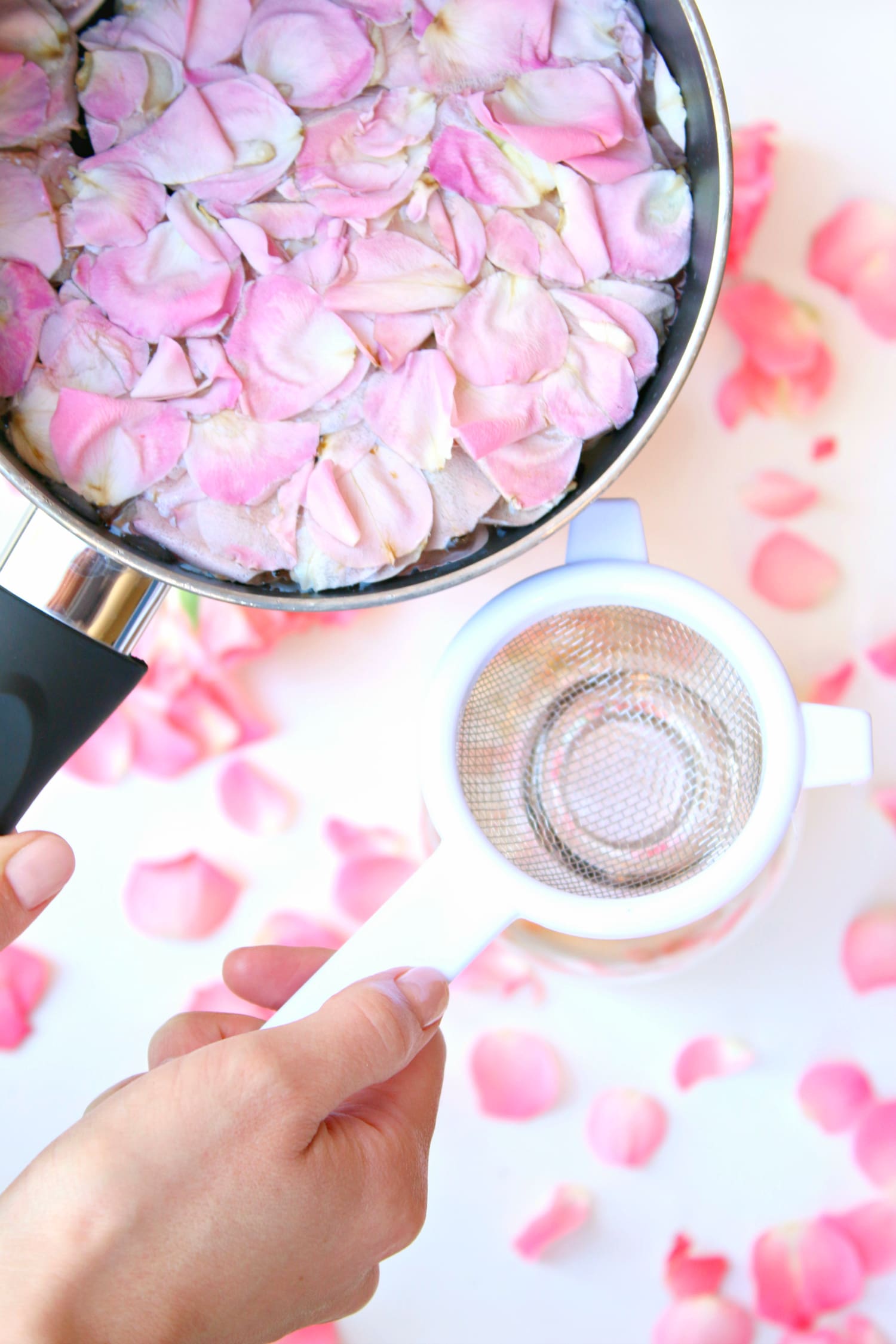
Step 7
You’ll notice that the homemade rose water will take on the color of its petals. Thanks primarily to the settings on my camera, mine looks a bit darker than it actually was. My rose water actually had much more of a subtle yellowish pink tint to it, but the coloring will vary depending on the type/color of roses you used.
Once the rose water is in its jar, secure it with an airtight lid and store it in the fridge. Any rose water without vodka will last about a week. If you added vodka as suggested, it will last up to two weeks.
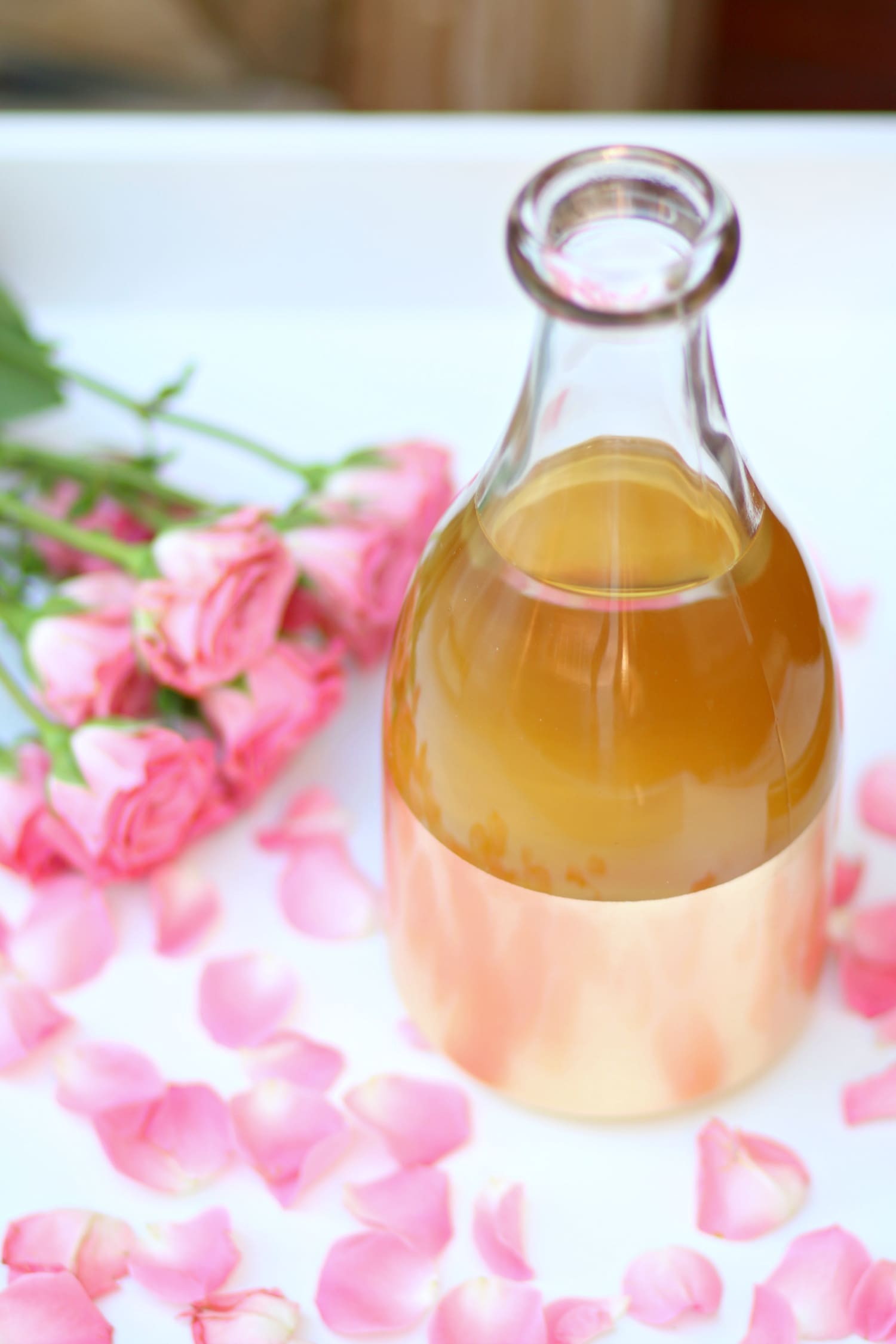

Also, this is random, but I found it helpful– WikiHow recommends keeping a smaller bottle on hand, as well. Their reasoning? A smaller bottle of homemade rose water will be easier to handle than a large mason jar. When you run out, just refill it using rose water from the bigger jar.
Homemade Rose Water FAQs
Why should you make your own rose water?
Making your own rose water versus buying it from the store comes down to preference. If you like homemade beauty recipes and are looking to save a little extra money, I highly recommend making your own rose water. For example, a 4oz bottle is about $12 online. So, if you’re going to be integrating it into your everyday beauty routine, yeah— it can get pretty dang pricey.
If not, it may make more sense to buy yours online. Just be mindful of the ingredients and make sure it’s specifically labeled food grade (like this bottle) before consuming it.
What does rose water taste like?
If you’re curious what rose water is supposed to taste like, my answer’s going to annoy you. Honestly, I found the taste to be really difficult to pinpoint. I’m going to try anyways, though.
The taste of rose water is refreshing and floral. In other words, yes, it tastes like you’re drinking a flower. As strange as it sounds to us, though, France regularly flavors macarons, éclairs, sorbets, madeleines, and a variety of other delicious goodies with rose water. It’s also used in rice puddings and lassis in India, and dried rose petals are common in English teas.
If you want to give it a try for yourself, I highly recommend mixing up a batch of rose margaritas! The recipe is the one I mentioned above (from one favorite Neopolitan pizza restaurant in Maine). It’s super tasty and unique, and it’s perfect for spring and summer.
What are some other homemade rose water uses?
If you made your own rose water at home and have some extra lying around, read this article from Elle! It talks about some cool new ways to use rose water and maximize the benefits.

How to Make Rose Water
Not only is rose water known for calming rosacea and inflammation, it's a great addition to desserts and cocktails, too! Make your own at home using only three basic ingredients: fresh rose petals, water, and vodka.
Materials
- One cup fresh organic rose petals
- 2 cups distilled water
- 2 tsp vodka
Tools
- Fine mesh strainer
- Funnel
Instructions
- Cut or purchase a small bouquet of fresh and fragrant roses. Pull the petals off of 2-3 flowers (you'll need enough to fill one cup) and gently rinse them with water to remove any dirt.
- Transfer the petals to a sauce pan. Pour in approximately two cups of distilled water and then add in 2 teaspoons of vodka.
- Cover the saucepan with a lid and let the rose water cook on very low heat for 20 minutes. Using too much heat can affect the color (and potentially reduce other benefits, too) of your rose water, so intermittently check to make sure the water isn't simmering.
- After the 20 minutes is up, carefully transfer the rose water into a large mason jar or container using a fine mesh strainer to catch the petals and a funnel to avoid spills.
- Store your homemade rose water in an airtight container in the fridge for up to 2 weeks.
Notes
Be sure to use only a single type of rose, since each species has its own distinct smell. Mixing the petals of different roses can affect with the overall color and fragrance of the rose water.
Although it’s not absolutely necessary, try to use an organic, pesticide-free, and edible type of rose, like Rosa Damascena (also known as the Damask rose), Rosa Centifolia (also known as the Provence rose, cabbage rose, or Rose de Mai), or Rosa Gallica (also known as the Gallic rose, French rose, or rose of Provins). If you’re dead set on picking up a regular bouquet at the grocery store, that’s still fine. Just rinse the flowers extra well and add in an extra 1/2 teaspoon of vodka.
More Homemade Beauty Recipes to Try
Roses really are incredible flowers, and their oil has some pretty amazing properties. When applied topically, rose essential oil is known for soothing redness and inflammation (among other things). Its scent is known for calming stress and anxiety, too. So, if you’re on a rose kick and looking for more homemade beauty recipes to try, here are a few I think you’ll like–
- Calming DIY Shower Steamers– Made with rose absolute oil, jasmine essential oil, and vetiver essential oil, these DIY shower steamers are perfect for relieving stress and anxiety! They also make incredible homemade gifts, too. I also love that you can totally customize the scent, too– just add in your own combination of essential oils.
- Homemade Rose Sugar Scrub– This DIY sugar scrub is as pretty as it is nourishing! It’s made with coconut oil, rose essential oil, sugar, and rose petals, and it’s perfect for gently exfoliating and soothing dry skin.
If tried this homemade rose water recipe at home, how did it go? Did you enjoy the taste and/or beauty benefits as much as you thought you would? As always, please don’t hesitate to let me know if you have any problems with this rose water recipe or any of my others. I love hearing from you guys, and I’m happy to help!




I have made something similar to this using my backyard roses when I have lots of blooms. I didn’t know vodka had all those amazing properties in it. I just know I like to drink it lol! I will have to give this a try sometime. :)
xo, Nicole
Thanks for this tutorial , Steph. Can’t wait to try out your recipe.
I have tried a regular rosewater spray that I just love, but expensive. I Also purchased a regular bottle of rose water from the middle east which is under $10. I am anxious to make my own, but I am concerned that the vodka may dry out my skin. Please let me know what you think, and thank you for all those wonderful ideas. Thank you
Margaret
Hey Margaret! I have SUPER sensitive skin, and it didn’t dry mine out… everybody is different, though! An alternative is to forego the fresh petals. They’re often fragrant and riddled with chemicals, which is the reason for the vodka. If you use dried rose petals, you’re in the clear! Hope that helps!!
Can’t wait to tryout.
Pingback: Refreshing Rose Margarita Recipe for Spring | Diary of a Debutante
Can’t wait to try this. My rose bush us overloaded and I have been looking for ways to utilize this beautiful ingredient. Thank you. ♡
I am so jealous! You can use this rose water to make toner, a handful of different cocktails and drinks– the sky’s the limit. Enjoy, Tammy! :)